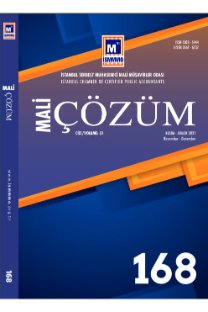Uluslararası muhasebe/ finansal raporlama standartlarının finansal tablolar analizi üzerindeki etkilerine genel bakış
Uluslararası Muhasebe/Finansal Raporlama Standartları işletmeyle ilgili karar vericilere işletmenin finansal durumu ve performansı hakkında daha güvenilir ve ihtiyaca uygun bilgi sağlamak üzere uygulamaya girmiştir. Dolayısıyla Standartlar kullanılarak finansal rapor hazırlamak ne kadar önemliyse bu tabloların doğru okunarak analiz edilebilmesi de en az o kadar önemlidir. Buna karşın muhasebe literatüründe finansal tabloların hazırlanmasına yönelik pek çok çalışma bulunmaktayken, Standartların tablolar üzerindeki etkileri analiz edenler açısından yeterli düzeyde ele alınmamaktadır. Bu çalışmayla, Standartlara göre hazırlanmış tabloların analizinde dikkat edilmesi gereken özellikli konuların bir kısmına dikkat çekilmek istenmektedir. Çalışmada değinilen konular ana başlıklarıyla Standartların işletme analizi ve finansal tablolar analizine genel yaklaşımı, yatırımcının bilgi ihtiyacının öne çıkarılması, tabloların ihtiyatlılık düzeyindeki değişmeler, konsolide tabloların analizine ilişkin zorluklar, Standartların sık değişikliğe uğramasının neden olabileceği sorunlar, muhasebe politikalarının kalitesi, politika değişiklikleri ve bunların neden olabileceği karşılaştırılabilirlik ve tutarlılık sorunları, tabloların yeni formatı, Standartların karmaşıklığı, tablo kalemlerinin değişen anlamları, yeni tablo kalemleri, nakit akış tablosunun artan önemi, Standartların performans raporlamasına ilişkin yeni yaklaşımı, risk yönetimine ilişkin modern bakış açısı ve raporlaması ile tahminler ve tahminlerin kalitesi şeklinde sıralanabilir.
The impacts of international accounting/ financial reporting standards on the financial statement analysis: An overview
International Accounting/Financial Reporting Standards are in use to inform various decision makers about financial position and performance of the companies in a more reliable and relevant notion. Thus, analysis of IFRS based reports should be as important as preparation of them. However, most of the IFRS related studies in the literature are providing guidance for the practical needs of preparers rather then approaching the issues from the analysts’ points of view. This study aims to discuss some specific topics regarding the analysis of IFRS based financial reports such as; the IFRSs view on the link between business analysis and financial statement analysis, considering the investors as the primary users, the possible effects of conservatism view of IFRSs on the financial statements, difficulties in the analysis of consolidated statements, problems arising due to frequent changes in standards, quality of accounting policies, comparability and consistency issues stemming from accounting policy changes, formats of the statements, complex nature of standards, new financial statement items which are unfamiliar to Turkish users, increasing importance of the statement of cash flows, new way of performance reporting, risk reporting, and the role of the quality of estimates and assumptions on the financial statements.
___
- Akdoğan, Nalan ve Tenker, Nejat (2006). Finansaî Tablolar Analizi. 11. bs. Ankara : Gazi Kitabevi.
- Arthur Levitt, "The Numbers Game", 28 Eylül 1998. [çevrimiçi erişim http://www.sec.gov/news/speech/speecharchive/1998/spch220.txtl
- Bertoni, M., De Rosa, B., Maffei, M. (2007). Comprehensive income under IFRS:evidence from a cross-sectional analysis, [y.y.] : European Financial Reporting Research Group, [çevrimiçi erişim : http://www.essec-kpmg.net/us/eufin/pdf/papers/Maffei-De%20Rosa-Bertoni.pdf
- Biddle, G. C, Choi, J. (2002). Is comprehensive income irrelevant? [y.y.] : Hong Kong University of Science and Technology, [çevrimiçi erişim : http://papers.ssrn.com/sol3/papers.cfm?abstract_id-316703
- Challenges and Successes in Implementing International Standards: Achieving Convergence to IFRSs and ISAs (2004). New York : International Federation of Accountants (IFAC)
- Chambers, D., Linsmeier, T.J., Shakespeare, G., Sougiannis T. (2007). "An evaluation of SEAS No. 130 comprehensive income disclosures", Review of Accounting Studies 12 (2007) : 57-593.
- Epstein, B. J. ve Jermakowicz, E. K. (2008), IFRS 2008 Interpretation and Application of International Financial Reporting Standards. USA : Wiley Publications,
- Ernstberger, J. (28-30 Eylül 2006). "Reporting Comprehensive Income under IFRS - Evidence From an Empirical Analysis" IFSAM VHIth World Congress, Berlin'de sunulan bildiri.
- http://www.ctw-congress.de/ifsam/download/track_7/pap00573.pdf
- EU Implementation of IFRS and the Fair Value Directive (2007). London : Institute of Chartered Accountants in England and Wales, ICAEW Financial Reporting Faculty. http:www.tmsk.org.tr (erişim tarihi: 15.03.2010)
- Hung, M. ve Subramanyam, K.R. (2004), Financial statement effects of adopting International Accounting Standards: the case of Germany, [çevrimiçi erişim : http://papers.ssrn.com/sol3/papers.cfm7abstract id=622921
- Imhoff, E.A., (2003). "Accounting Quality, Auditing and Corporate Governance" Accounting Horizons. (2003): 117-128.
- İbiş, Cemal ve Özkan, Serdar (2006). "Uluslararası Finansal Raporlama Standartları (UFRS)'na Genel Bakış)" Mali Çözüm Dergisi. 74 (2006): 25-43.
- Kanagaretnam K., Mathieu R., Shehata M. (2009). "Usefulness of Comprehensive Income Reporting in Canada", Journal of Accounting and Public Policy, 28 (2009): 349-365.
- Nelson, M.W., (2003). "Behavioral Evidence on the Effects of Principles and Rules Based Standards" Accounting Horizons 17, 1 (2003): 91-104.
- O'Hanlon, J. A.ve Pope, P E (1999). "The value relevance of U.K. dirty surplus accounting flows", British Accounting Review 31 (1999): 459-482.
- Observations on Implementation of IFRS(2006). [y.y]: Ernst&Young Özkan, Serdar ve Kaytmaz, Ç.B. (2009). Impact of Audit Quality on Accounting Policy Disclosures: Implications on Revenue Recognition Policy, SSRN [çevrimiçi erişim: http://papers.ssrn.com/sol3/papers.cfm?abstract_id= 1490105]
- Radebaugh L.H., Gray SJ. ve Black E.L., (2006). International Accounting and Multinational Enterprises. 6.bs. [y.y]: John Wiley & Sons.
- Schipper K., (2003). "Principles Based Accounting Standards" Accounting Horizons. 17,1 (2003): 61-72.
- SFAS 130: Reporting Comprehensive Income(1997). [y.y]: Financial Accounting Standards Board (FASB)
- Thinggaard, F...[ve öte.](2006). "Performance reporting - the IASB's proposed formats of financial statements in the exposure draft of IAS 1". Accounting in Europe. 3 (2006): 35-63.
- Wild, JJ, Subramanyam, K.R., Halsey, R. E, (2007). Financial Statement Analysis, [y.y] : McGraw Hill.
- ISSN: 1303-5444
- Yayın Aralığı: Yılda 6 Sayı
- Başlangıç: 1991
- Yayıncı: İstanbul Serbest Muhasebeci Mali Müşavirler Odası
